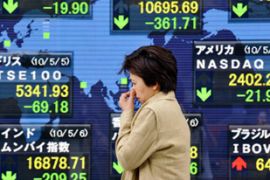Asia markets slide on Greece fears
Shares follow steep losses on Wall Street amid fears Greek debt crisis will spread.

“These European concerns have taken a big turn for the worse,” Ben Potter, an analyst at IG Markets, said.
“It’s going to be a very dark day across the board.”
Jitters
In South Korea, the benchmark Kospi index fell by 2.2 per cent at close, having hit its lowest level since early March just a quarter of an hour after opening.
|
“The market is in a state of panic” Sun-yeb, |
“The market is in a state of panic,” Lee Sun-yeb, a market analyst at Shinhan Investment Corporation in Seoul, told the Reuters news agency.
“Fears that the woes being suffered by Greece could spread to other countries such as Spain or Portugal are spreading and affecting sentiment.”
China’s benchmark Shanghai index tumbled 2.4 per cent in early trade, though rallied later, with shares in Taiwan, Singapore and New Zealand all falling sharply.
The sharp sell-off across Asia came after the Dow Jones index’s biggest ever intra-day drop caused panic selling in US markets overnight, wiping out billions of dollars in market value.
At one point on Thursday the Dow was down by 1,000 points or around nine per cent, although it later recovered to close the day at 10,520.32, down 3.2 per cent.
There was speculation that the sharp fall in the Dow may have been caused by a typographical error in automated trading systems.
The plunge lasted only a few minutes but nonetheless added to jitters among investors already worried about fallout from Greece’s debt problems and gave a sobering reminder of the continuing fragility of global financial markets.
At the peak of the sell-off, the slump wiped nearly $1trn off the face value of US equities.
‘Ensure stability’
With impact of the the Greek crisis showing little sign of slowing, the Bank of Japan said on Friday that it would offer offer two trillion yen ($22bn) in short-term loans to commercial banks to boost liquidity.
| in depth | |||||||||||||||||||||||||||||
|
“We would like to ensure stability in financial markets by providing ample funds to banks,” Bank of Japan official Yuichi Adachi said.
Kazuhiro Takahashi, general manager at Daiwa Securities Capital Markets in Tokyo, told Reuters that the situation in Greece had triggered fears that other eurozone nations could also be hit, plunging Europe back into recession and sending damaging ripples around the world.
“The Greece debt crisis is reminding investors of what happened after Lehman Brothers’ collapse,” he said.
“A failure by one financial institution ended up triggering a ripple effect on the global economy.”
Song Seng Wun, an economist with CIMB-GK Research, told Al Jazeera that Asian markets remained in a good relative position but that could change.
“Low debt Asian economies are still preferred and it still looks like we are going to see money flowing into Asia given the strong fundamentals,” Song said.
“But then again if the European economies continue to stay weak we will be dragged along as well, it is just a matter of time.”
Germany, the strongest EU-zone economy which has held up passing emergency loans to Greece, is to hold a final vote in parliament on the aid on Friday. Berlin has pushed for greater cutbacks from Greece.
The French Senate approved their nation’s contribution to the EU loan package late on Thursday, providing for up to $22.5bn over the next three years.
